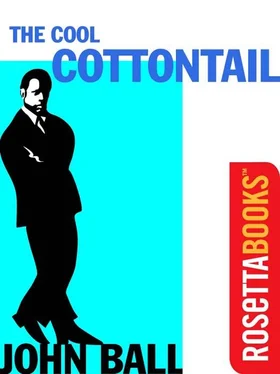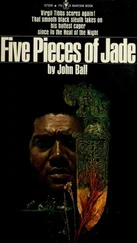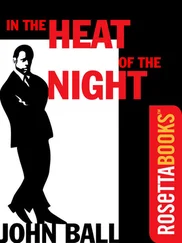John Ball - The Cool Cottontail
Здесь есть возможность читать онлайн «John Ball - The Cool Cottontail» весь текст электронной книги совершенно бесплатно (целиком полную версию без сокращений). В некоторых случаях можно слушать аудио, скачать через торрент в формате fb2 и присутствует краткое содержание. Год выпуска: 1966, ISBN: 1966, Издательство: RosettaBooks, Жанр: Полицейский детектив, на английском языке. Описание произведения, (предисловие) а так же отзывы посетителей доступны на портале библиотеки ЛибКат.
- Название:The Cool Cottontail
- Автор:
- Издательство:RosettaBooks
- Жанр:
- Год:1966
- ISBN:978-0-7953-1757-6
- Рейтинг книги:5 / 5. Голосов: 1
-
Избранное:Добавить в избранное
- Отзывы:
-
Ваша оценка:
- 100
- 1
- 2
- 3
- 4
- 5
The Cool Cottontail: краткое содержание, описание и аннотация
Предлагаем к чтению аннотацию, описание, краткое содержание или предисловие (зависит от того, что написал сам автор книги «The Cool Cottontail»). Если вы не нашли необходимую информацию о книге — напишите в комментариях, мы постараемся отыскать её.
The Cool Cottontail — читать онлайн бесплатно полную книгу (весь текст) целиком
Ниже представлен текст книги, разбитый по страницам. Система сохранения места последней прочитанной страницы, позволяет с удобством читать онлайн бесплатно книгу «The Cool Cottontail», без необходимости каждый раз заново искать на чём Вы остановились. Поставьте закладку, и сможете в любой момент перейти на страницу, на которой закончили чтение.
Интервал:
Закладка:
chapter 14
The Wednesday-morning mail brought the final autopsy report from San Bernardino, just in time to suit Virgil’s purposes. He tore open the thick official envelope and studied the grim contents thoroughly.
When he had been over the report twice, he picked up a pad of paper and sketched the outlines of a human figure in both front and profile views. Then he carefully shaded in the areas where, according to the autopsy, the body had received blows. When he had finished, he had a reasonably accurate picture of the beating the dead chemist had received, with those particular areas that had contributed specifically to his death outlined in red.
Satisfied with his work, he phoned Michael Wolfram, the attorney. When he had the lawyer on the line, he came right to the point.
“Mr. Wolfram, knowing that you represent Walter McCormack, and that he and the late Dr. Roussel were both close friends and business associates, it occurred to me that you might also have handled Dr. Roussel’s legal business in this country.”
“You’re quite right,” Wolfram acknowledged. “What can I do for you?”
Tibbs made an appointment for eleven-thirty and hung up. After glancing through the rest of his mail, which was unimportant, he left the office and picked up one of the official cars that carry the special equipment used by the Investigative Division and drove it southward from the Pasadena civic center.
On the way down the Arroyo Seco toward the freeway, an ancient car with the front end dipped significantly down pulled illegally close behind him. Virgil glanced into the mirror and saw that the two occupants were boys, neither of whom appeared old enough to have a driving license. In a few seconds the car whipped out, drew alongside him, and then pulled to a stop at a red light. The boy on the right leaned out and slapped the side of the door.
“Come on, black boy!” he shouted. “Let’s see if you can go.”
When the light changed, the old car jumped forward, burning rubber on the dry concrete. As soon as it was ahead, the driver swung it recklessly close in front of the unmarked police car and hit the brakes. Virgil knew the maneuver and was ready; having already checked that there was no other traffic, he cut sharply to the left and then, reaching down, touched the control for the concealed siren under the hood. He did not allow it to come up to speed; he sounded it only enough so that the other driver would recognize what it was.
At once the dragsters became ultra-respectable; their old car moved into the right-hand lane and sedately held to the legal speed limit. As Virgil drove past, he looked carefully at the driver and checked the license plate against the hot sheet that is issued daily by the Los Angeles Police Department. Then he picked up the radio mike.
Within four blocks a motorcycle officer appeared at a traffic light and fell in behind the modified car. The situation under control, Virgil cleared the green light at the beginning of the freeway and came up to speed. He relaxed during the fifteen minutes it took him to reach the four-level interchange, and then continued on straight through down the Harbor Freeway until he reached Olympic, where he turned off and headed westward. Within a minute or two he pulled up across the street from a sign that read “ALL AMERICA KARATE FEDERATION” and flipped down the visor that would identify the car to any police officer. He got out and walked into the building.
The Nisei at the front counter looked up and registered mild surprise. “Hello, Virgil, didn’t expect you.”
“Is Sensei *here?” Tibbs asked.
“Just changing. You can catch him in the locker room.”
Virgil walked down the short corridor past the exercise rooms and the main training area and turned into the dressing room. In his hand he held the sketches he had made before leaving his office.
In the Spartan but efficient locker room there were two men, both of whom were knotting black belts as Tibbs came in. The one nearer to him was a Japanese of medium height and apparently light build, although the white training gi he was wearing concealed the outlines of his physique. He was in his mid-thirties and obviously charged with a high level of controlled nervous energy. As Virgil walked in, he looked up and flashed a smile.
“Good morning, Virgil,” he said with a perceptible accent.
“Good morning, Sensei.” Tibbs shook hands with both men and produced his sketches. Then he hesitated. The man to whom he wanted to speak had a limited command of English, and he did not wish to risk giving offense. Since the second man was a Nisei, he solved the problem by explaining the problem to them both. He gave a brief account of the murder and pointed out the significant areas in the drawings.
His diplomacy was successful. The man he had addressed as Sensei examined the drawings carefully and asked several questions of his companion in rapid staccato Japanese. They were answered just as fluently, and what was clearly a technical discussion continued for some time. Then the Nisei turned to Tibbs.
“Nishiyama Sensei would like to know the exact height and weight of the dead man, if you have that information.”
Virgil supplied the figures from memory; Nishiyama nodded again quickly and once more consulted the drawings. Then the karate master shook his head.
“It was not a karate man,” he explained. Continuing in English, he began a technical description that Tibbs listened to attentively. Although he was himself highly trained in the art, he knew that he could not match his knowledge against that of a world authority. The essence of Nishiyama’s opinion was that the killer had been well schooled in no-holds-barred street fighting and had attained reasonable proficiency, but he did not know karate. The master based his conclusions not only on the nature of the blows the body had received but also on the number. A competent karate man would not have required the quantity shown.
Tibbs thanked him warmly and declined an invitation to remain and train for a period of what Nishiyama chose to call light sparring. He had sparred with Nishiyama before, and despite what he had learned from the session, he was in no immediate hurry to repeat the experience.
Armed with the information, which had confirmed his own opinion, Virgil returned to his car and set out for his appointment with the attorney. His case was now very nearly complete, but for that very reason he was determined to overlook no detail that might later prove to be significant.
When he reached the attorney’s office, Wolfram received him and motioned him to a chair. He proved to be an unexpectedly small man whose immaculate, expensive suit contrasted with his bushy, undisciplined hair. Tibbs noted that all the furniture in the office was scaled down to minimize the slight stature of Wolfram, who looked more like a successful retired jockey than a power in the courtroom.
After the amenities, Virgil outlined the case, concerning which the attorney was already partially informed. As he neared the end of his recital, Wolfram interrupted. “Mr. Tibbs,” he asked, “are you coming to the point of telling me that one of my clients is in jeopardy?”
“No,” Virgil answered. “At least not at this time. Of course, I don’t know your client roster, so I couldn’t answer that question in any event. Actually I’m here for information.”
Wolfram nodded. “Please go on.”
“When are you going to submit Dr. Roussel’s will for probate?”
“Almost immediately-in fact, today.”
“Would you have any serious objection if I asked you to postpone doing so for, say, twenty-four hours?”
Wolfram leaned back and suddenly, despite his small size, looked remarkably shrewd and responsible. “Would you care to give me a reason?” he asked.
Читать дальшеИнтервал:
Закладка:
Похожие книги на «The Cool Cottontail»
Представляем Вашему вниманию похожие книги на «The Cool Cottontail» списком для выбора. Мы отобрали схожую по названию и смыслу литературу в надежде предоставить читателям больше вариантов отыскать новые, интересные, ещё непрочитанные произведения.
Обсуждение, отзывы о книге «The Cool Cottontail» и просто собственные мнения читателей. Оставьте ваши комментарии, напишите, что Вы думаете о произведении, его смысле или главных героях. Укажите что конкретно понравилось, а что нет, и почему Вы так считаете.












